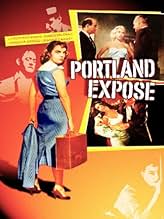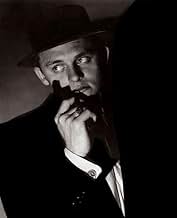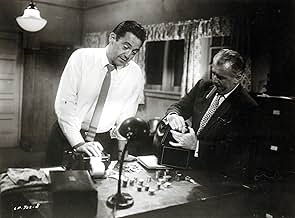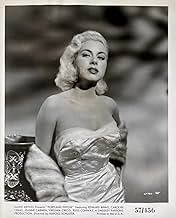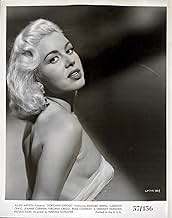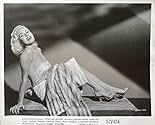A tavern owner in mid-century Portland, Oregon finds the safety of himself and his family threatened when he becomes involved in a war between labor unions and a violent local crime syndicat... Read allA tavern owner in mid-century Portland, Oregon finds the safety of himself and his family threatened when he becomes involved in a war between labor unions and a violent local crime syndicate.A tavern owner in mid-century Portland, Oregon finds the safety of himself and his family threatened when he becomes involved in a war between labor unions and a violent local crime syndicate.
Lawrence Dobkin
- Garnell
- (as Larry Dobkin)
Joseph Marr
- Larry
- (as Joe Marr)
Richard Bellis
- Jimmy Madison
- (as Dickie Bellis)
John Alban
- Tavern Patron
- (uncredited)
Albert Cavens
- Tavern Patron
- (uncredited)
Beulah Christian
- Tavern Patron
- (uncredited)
Francis De Sales
- Alfred Grey
- (uncredited)
Kort Falkenberg
- Speed Bromley
- (uncredited)
Stanley Farrar
- Spud Lennox
- (uncredited)
- Director
- Writer
- All cast & crew
- Production, box office & more at IMDbPro
Featured reviews
Edward Binns stars in this B movie about a tavern owner in Portland who is offered a jukebox, a pinball machine, and a slot machine to install.
However, a tough syndicate takes over the area and begins controlling the business, turning it into a hard-core gambling establishment that includes B girls.
At first, family man George Madison goes along after his family is threatened. However, one night, a thug that likes jail bait (Frank Gorshin) nearly rapes his daughter (Carolyn Craig). Madison sends his family away and agrees to go undercover, wearing a wire.
Nothing special, the underdog against a crime syndicate. However, it does show a wholesome American '50s family up against the sleazeballs. It's also fairly gritty.
The story is based on Portland crime boss Big Jim Elkins.
Jeanne Carmen, purportedly a close confidant of Marilyn Monroe, does a terrific job as the B girl who exposes Madison as undercover. Carmen claimed knowledge of Monroe and the Kennedys.
After the death of Monroe, Jimmy Rosselli, who worked for Sam Giancana, told get to leave Hollywood as her life was in danger. She lived incognito for over a decade. However, her stories have been questioned and denied by those who knew Monroe.
However, a tough syndicate takes over the area and begins controlling the business, turning it into a hard-core gambling establishment that includes B girls.
At first, family man George Madison goes along after his family is threatened. However, one night, a thug that likes jail bait (Frank Gorshin) nearly rapes his daughter (Carolyn Craig). Madison sends his family away and agrees to go undercover, wearing a wire.
Nothing special, the underdog against a crime syndicate. However, it does show a wholesome American '50s family up against the sleazeballs. It's also fairly gritty.
The story is based on Portland crime boss Big Jim Elkins.
Jeanne Carmen, purportedly a close confidant of Marilyn Monroe, does a terrific job as the B girl who exposes Madison as undercover. Carmen claimed knowledge of Monroe and the Kennedys.
After the death of Monroe, Jimmy Rosselli, who worked for Sam Giancana, told get to leave Hollywood as her life was in danger. She lived incognito for over a decade. However, her stories have been questioned and denied by those who knew Monroe.
No it's Not...New York, L. A., Chicago, Miami, Las Vegas, Kansas City, or even Phoenix...it's Portland.
Another City Cracked-Open Exposing Vice, Corruption, and Organized Crime Beneath the "All-American" Facade...
"People here go to a lot of nice Churches"...
says a Voice-Over Open Warning that these Folks are being Preyed-Upon by Gangsters, Organized or Other-Wise and Your Government is "On-the-Case" and "Looking Out For You".
Almost a Forced "Survival" for Hollywood, that by 1950 the "Movie-Machine" better get with the "Program"...
and Back-Out of the "Back-Alleys" and Offer Affirming "Procedurals" with a "Propagandized" Core of Government, Law Enforcement, and Politicians that were "Fighting the Good Fight"...
and that Depressing, Dark-Side of Life where Film-Noir was "Born and Raised" for a Decade was No Longer Fit for the Living-Rooms of the Nuclear-Family of Eisenhower-Era "Pre-Cognizance".
Among the Direction and Trend that "Pure" Film-Noir Morphed Into was a Sub-Genre that became Known as "Police Procedurals"...
and a Sub-Genre of that was the Run of "City-Expose" that had an Almost Yearly Entry During the 1950's. Most of the Movies were at Least Watchable Crime-Action Melodramas and some were Excellent and a Few were "Great"...
Considered one of the Best was "Kansas City Confidential" (1952), there were others almost as good, Like "The Phoenix City Story (1955), and as a Whole, None were Bad or Awful.
This is One of the Better Ones.
Although its Low-Budget Rears its Miserly Head Once in a While, the Movie more than Makes Up for that Shortcoming with some Really Gritty, Sleazy, and Hard-Boiled Stuff.
Frank Gorshin Makes a Mark as a Convicted Pedophile that Immediately Tries to Rape a High School Girl (Carolyn Craig)...and its Not Shy with the Visuals.
She is the daughter of Edward Binns, who the Low-Life Mobsters Lean On to Play-Ball, allowing Pin-Ball and Slots, in His Roadside Restaurant and Bar, with Hints of Gambling and Prostitution Down the Road.
Nothing Here is Restrained and Pushes the Code Quite Often with its Girls, Torture (a bottle of "acid" is luridly lingered upon), Violence (one Goon is cut in half, as another one grins, by a steaming locomotive), and of course Corruption.
Of Everyone and Everything, Including (this is the 50's)...Unions).
Our Hero Wears a Wire. It's as Big as a Shoe-Box.
This is a No Holds-Barred Entry in the Sub-Genre of the Sub-Genre.
For Fans of Film-Noir, Crime, Gangsters, and Low-Brow Pulp-Fiction, it's a Must See.
For Others.... Worth a Watch.
Another City Cracked-Open Exposing Vice, Corruption, and Organized Crime Beneath the "All-American" Facade...
"People here go to a lot of nice Churches"...
says a Voice-Over Open Warning that these Folks are being Preyed-Upon by Gangsters, Organized or Other-Wise and Your Government is "On-the-Case" and "Looking Out For You".
Almost a Forced "Survival" for Hollywood, that by 1950 the "Movie-Machine" better get with the "Program"...
and Back-Out of the "Back-Alleys" and Offer Affirming "Procedurals" with a "Propagandized" Core of Government, Law Enforcement, and Politicians that were "Fighting the Good Fight"...
and that Depressing, Dark-Side of Life where Film-Noir was "Born and Raised" for a Decade was No Longer Fit for the Living-Rooms of the Nuclear-Family of Eisenhower-Era "Pre-Cognizance".
Among the Direction and Trend that "Pure" Film-Noir Morphed Into was a Sub-Genre that became Known as "Police Procedurals"...
and a Sub-Genre of that was the Run of "City-Expose" that had an Almost Yearly Entry During the 1950's. Most of the Movies were at Least Watchable Crime-Action Melodramas and some were Excellent and a Few were "Great"...
Considered one of the Best was "Kansas City Confidential" (1952), there were others almost as good, Like "The Phoenix City Story (1955), and as a Whole, None were Bad or Awful.
This is One of the Better Ones.
Although its Low-Budget Rears its Miserly Head Once in a While, the Movie more than Makes Up for that Shortcoming with some Really Gritty, Sleazy, and Hard-Boiled Stuff.
Frank Gorshin Makes a Mark as a Convicted Pedophile that Immediately Tries to Rape a High School Girl (Carolyn Craig)...and its Not Shy with the Visuals.
She is the daughter of Edward Binns, who the Low-Life Mobsters Lean On to Play-Ball, allowing Pin-Ball and Slots, in His Roadside Restaurant and Bar, with Hints of Gambling and Prostitution Down the Road.
Nothing Here is Restrained and Pushes the Code Quite Often with its Girls, Torture (a bottle of "acid" is luridly lingered upon), Violence (one Goon is cut in half, as another one grins, by a steaming locomotive), and of course Corruption.
Of Everyone and Everything, Including (this is the 50's)...Unions).
Our Hero Wears a Wire. It's as Big as a Shoe-Box.
This is a No Holds-Barred Entry in the Sub-Genre of the Sub-Genre.
For Fans of Film-Noir, Crime, Gangsters, and Low-Brow Pulp-Fiction, it's a Must See.
For Others.... Worth a Watch.
This film begins with a rather unnecessary and stuffy prologue. Fortunately, despite this weak introduction, the film turns out to be a very, very tough film indeed--with thugs who are child molesters or threaten to throw acid in people's faces. This is NOT your typical 1950s Film Noir movie, but a hard as nails look at organized crime in a rather unexpected locale--Portland, Oregon.
You'll probably notice Virginia Gregg in the female lead. She was seen in 1001 "Dragnet" episodes. Edward Binns, a fine character actor whose name you probably won't recognize plays Gregg's husband--a man who is being forced by the local mob to play ball. Frank Gorshin, in a small but memorable role, plays the rapist who is so vile even the gang is disgusted by him.
As for the plot, it's a very familiar one--having been seen in such earlier films as LOAN SHARK and APPOINTMENT WITH DANGER. An honest guy is sick of the mob, so he agrees to join them in order to get evidence to prosecute them. In this case, Binns pretends to be a rather worldly and not too honest man who is interested in moving up in the organization. However, despite being familiar, the film is handled well and is more than just another time-passer.
You'll probably notice Virginia Gregg in the female lead. She was seen in 1001 "Dragnet" episodes. Edward Binns, a fine character actor whose name you probably won't recognize plays Gregg's husband--a man who is being forced by the local mob to play ball. Frank Gorshin, in a small but memorable role, plays the rapist who is so vile even the gang is disgusted by him.
As for the plot, it's a very familiar one--having been seen in such earlier films as LOAN SHARK and APPOINTMENT WITH DANGER. An honest guy is sick of the mob, so he agrees to join them in order to get evidence to prosecute them. In this case, Binns pretends to be a rather worldly and not too honest man who is interested in moving up in the organization. However, despite being familiar, the film is handled well and is more than just another time-passer.
A tavern owner helps authorities get the goods on gangs trying to take over a labor union.
This Lindsley Parsons production is one of the many "confidential" or "expose" films of the time. Usually the tabloid title would include the name of a city whose supposed racketeers the movie would then expose. This movie appears inspired by the acid blinding of New York City labor reporter Victor Riesel in 1956 for his investigations into labor racketeering in that city.
The low-budget Parsons outfit may have produced this programmer, but they managed two key assets, despite the lowly origins. First, they got heavyweight actor Ed Binns for the lead, along with familiar face Virginia Gregg and that fine little actress Carolyn Craig. What Binns lacks in marquee value, he makes up for in sheer talent, having been one of the Twelve Angry Men (1957) in that powerhouse film of the same year.
Second, the movie did extensive location filming in Portland, lending the visuals both interest and a realistic air. The woodsy tavern, in particular, looks genuine instead of the usual Hollywood fakery. Then too, the screenplay manages some suspense, especially when Madison (Binns) goes undercover. But the highlight may be hoodlum Joe's (Gorshin) attempted rape of sweet little Ruth (Craig). It's pretty explicit for the time.
If there's a downside, in my book, it's the absence of real menace from any of the bad guys (contrast with the subtle menace of kingpin Edward Andrews' in Phenix City Story {1955}). All in all, however, the movie manages a number of interesting features without being anything special.
(In passing—Catch sexpot Jeanne Carmen (Iris) who was Marilyn Monroe's "bosom buddy" in more obvious ways than one. Also, such a shame that Carolyn Craig died so young and under rather mysterious circumstances, as well.)
This Lindsley Parsons production is one of the many "confidential" or "expose" films of the time. Usually the tabloid title would include the name of a city whose supposed racketeers the movie would then expose. This movie appears inspired by the acid blinding of New York City labor reporter Victor Riesel in 1956 for his investigations into labor racketeering in that city.
The low-budget Parsons outfit may have produced this programmer, but they managed two key assets, despite the lowly origins. First, they got heavyweight actor Ed Binns for the lead, along with familiar face Virginia Gregg and that fine little actress Carolyn Craig. What Binns lacks in marquee value, he makes up for in sheer talent, having been one of the Twelve Angry Men (1957) in that powerhouse film of the same year.
Second, the movie did extensive location filming in Portland, lending the visuals both interest and a realistic air. The woodsy tavern, in particular, looks genuine instead of the usual Hollywood fakery. Then too, the screenplay manages some suspense, especially when Madison (Binns) goes undercover. But the highlight may be hoodlum Joe's (Gorshin) attempted rape of sweet little Ruth (Craig). It's pretty explicit for the time.
If there's a downside, in my book, it's the absence of real menace from any of the bad guys (contrast with the subtle menace of kingpin Edward Andrews' in Phenix City Story {1955}). All in all, however, the movie manages a number of interesting features without being anything special.
(In passing—Catch sexpot Jeanne Carmen (Iris) who was Marilyn Monroe's "bosom buddy" in more obvious ways than one. Also, such a shame that Carolyn Craig died so young and under rather mysterious circumstances, as well.)
Portland Express (1957)
Overall, this is often a stilted affair, and it begins and ends with a canned voice-over about Portland, the Oregon city at the center of this unlikely crime scenario. And for people looking for noir, this is not noir at all, though it does have a kind of throwback to some gangster thugs, and there is a good twenty minutes of night stuff that has a noir look.
Portland Express is more about American innocence, and the surprise anachronism of these mobsters in fedoras pressuring a cute roadhouse into using their pinball machines. Which leads to bigger pressures.
The lead man is a small time movie and later t.v. character, Edward Binns, a solid but unexciting actor, sort of perfect for this solid but unexciting town (back then--now I hear it's solid and exciting). And his daughter is a complete unknown who acts her heart out, and really feels like a teenager on the cusp of womanhood in a realistic way. This matters because she becomes central to the plot, including in a harrowing and almost abusive rape scene (it pushes the violence very hard for a movie of this simplicity). But it's a turning point for Binns, the father, and for the plot, as this likable, ordinary family man goes undercover to get the bad guys.
Naturally, we root for him, and see the dismantling of the syndicate. It gets increasingly dark and desperate over time, and a bit unlikely, but you'll still want to watch to the end, when the cavalry arrives--a group of ordinary men in plaid shirts who rush in to save the day. It's not as hilarious as it sounds. There is a quality of really beautiful, ordinary middle-America here that resonates, and that helps show this is really a 1950s movie. It's widescreen black and white, and a genuine slice of its period.
Overall, this is often a stilted affair, and it begins and ends with a canned voice-over about Portland, the Oregon city at the center of this unlikely crime scenario. And for people looking for noir, this is not noir at all, though it does have a kind of throwback to some gangster thugs, and there is a good twenty minutes of night stuff that has a noir look.
Portland Express is more about American innocence, and the surprise anachronism of these mobsters in fedoras pressuring a cute roadhouse into using their pinball machines. Which leads to bigger pressures.
The lead man is a small time movie and later t.v. character, Edward Binns, a solid but unexciting actor, sort of perfect for this solid but unexciting town (back then--now I hear it's solid and exciting). And his daughter is a complete unknown who acts her heart out, and really feels like a teenager on the cusp of womanhood in a realistic way. This matters because she becomes central to the plot, including in a harrowing and almost abusive rape scene (it pushes the violence very hard for a movie of this simplicity). But it's a turning point for Binns, the father, and for the plot, as this likable, ordinary family man goes undercover to get the bad guys.
Naturally, we root for him, and see the dismantling of the syndicate. It gets increasingly dark and desperate over time, and a bit unlikely, but you'll still want to watch to the end, when the cavalry arrives--a group of ordinary men in plaid shirts who rush in to save the day. It's not as hilarious as it sounds. There is a quality of really beautiful, ordinary middle-America here that resonates, and that helps show this is really a 1950s movie. It's widescreen black and white, and a genuine slice of its period.
Did you know
- TriviaFinal film of Lea Penman.
- ConnectionsFeatured in WatchMojo: Top 10 Movies Banned ONLY in America (2022)
- How long is Portland Exposé?Powered by Alexa
Details
- Release date
- Country of origin
- Official sites
- Language
- Also known as
- Portland Expose
- Filming locations
- Production company
- See more company credits at IMDbPro
- Runtime
- 1h 12m(72 min)
- Color
- Aspect ratio
- 1.85 : 1
Contribute to this page
Suggest an edit or add missing content


